Key takeaways:
- Consumer protection laws empower consumers by providing rights against unfair business practices, ensuring transparency and accountability in the marketplace.
- Key components of consumer protection include the right to information, fair treatment, and product safety, which collectively promote informed decision-making and trust between consumers and businesses.
- Future trends in consumer protection will focus on enhanced technological transparency, stronger data privacy regulations, and more inclusive laws catering to diverse consumer needs.
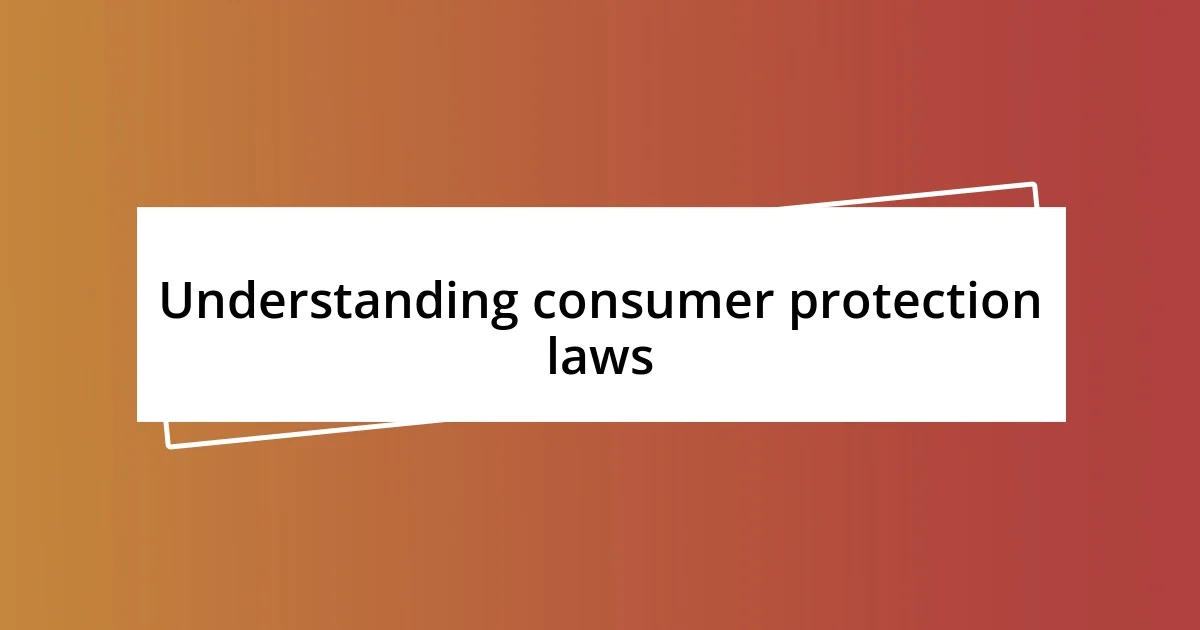
Understanding consumer protection laws
Consumer protection laws are designed to safeguard buyers from unfair business practices and provide a framework for rights in the marketplace. I remember a time when I faced a particularly frustrating issue with a faulty product. It made me realize just how vital these laws are; they give consumers a voice and a means to seek justice when they’ve been wronged.
Have you ever wondered what would happen if there were no regulations to protect consumers? Think about the countless situations where businesses might take advantage of consumers, selling subpar goods or hiding critical information. These laws not only shield us from deceptive practices but also promote fairness and transparency, reminding businesses that ethical conduct is essential.
In my experience, understanding your rights under consumer protection laws can be empowering. When I first learned about my rights regarding refunds and warranties, it felt like I was equipped with armor to tackle any buyer’s remorse I might encounter. This knowledge encourages consumers to stand up for themselves and promotes a healthier marketplace overall, benefiting everyone involved.
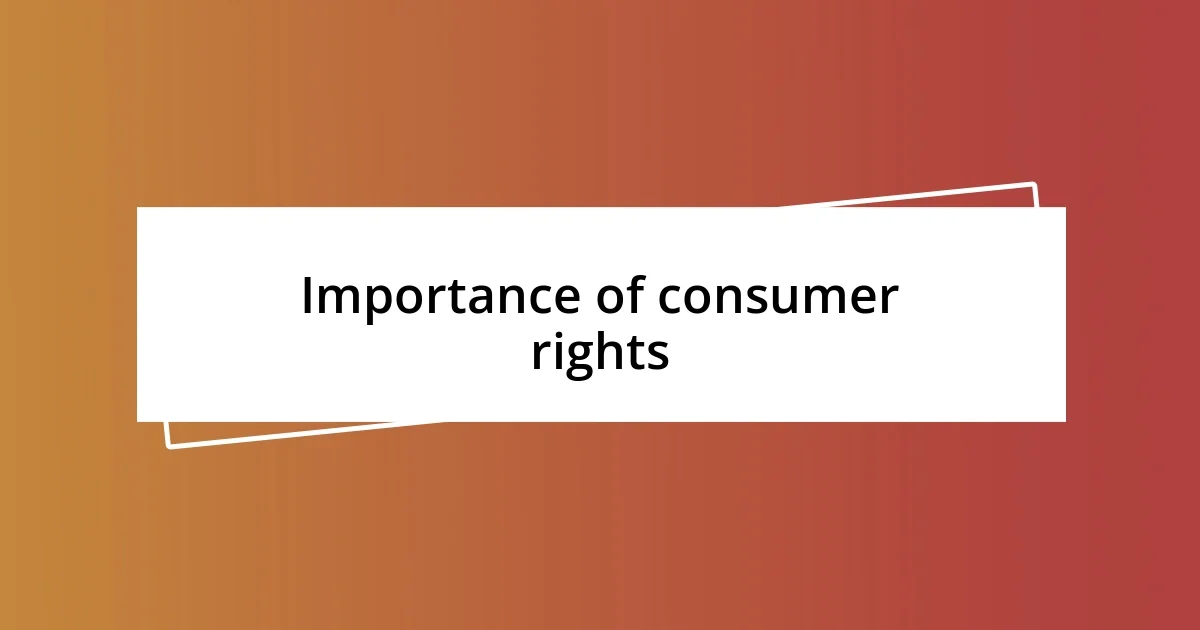
Importance of consumer rights
Consumer rights serve as essential protections in our buying decisions. Without them, we’d navigate a marketplace rife with uncertainty and potential exploitation. I recall a situation where I purchased a smartphone that had a manufacturing defect. When I reached out to customer service, knowing my rights made all the difference. It was empowering to assert those rights, leading me to a swift resolution.
Having a solid grasp of consumer rights fosters trust between businesses and consumers. I once hesitated to buy a pricey electronic gadget because I was unsure if the warranty coverage was genuine. Thankfully, after a little research, I discovered consumer protection laws that mandated clear warranties. That knowledge reassured me, and I made the purchase confidently, knowing I was wronged; I had recourse.
Moreover, understanding your consumer rights cultivates a more respectful marketplace. Each time I witness a fellow shopper advocating for their rights, it reinforces the communal spirit of consumer protection. It’s inspiring to see how collective awareness can hold businesses accountable, ensuring they consistently provide quality and value.
| Aspect | Importance |
|---|---|
| Empowerment | Knowledge of rights allows consumers to confidently assert themselves in disputes. |
| Trust | Clear rights foster a relationship where businesses value their customers. |
| Accountability | Awareness of rights encourages businesses to maintain ethical standards. |
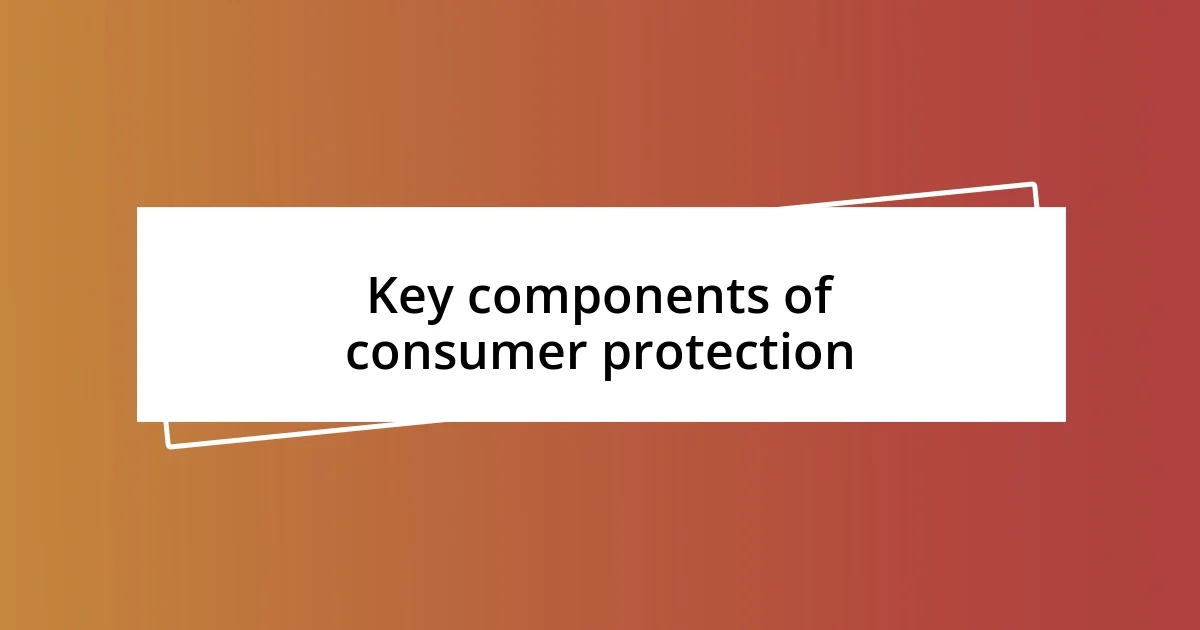
Key components of consumer protection
Consumer protection encompasses several key components that work together to create safer buying experiences. One of the most critical aspects is the right to information. I once found myself frustrated while shopping for health products; the lack of clear ingredient labels left me feeling vulnerable. Laws that mandate transparency not only empower me but ensure I can make informed decisions about what I am consuming.
- Right to Information: Consumers deserve full disclosure of product ingredients and terms of services.
- Right to Safety: Regulations are in place to ensure that products meet safety standards to prevent harm.
- Redress: Consumers should have accessible channels for complaints and remedies if products or services don’t meet expectations.
Another vital component is the protection against unfair trade practices. I remember feeling anxious during a vehicle purchase, with that nagging worry about potential hidden fees. Knowing there were legal protections that prohibited deceptive advertising made me feel safer in my decision-making. When companies are held accountable for their promises, it builds a foundation of trust in the marketplace.
- Fair Treatment: Consumers must not be subjected to misleading sales tactics or unfair contract terms.
- Product Recalls: Laws ensure timely notifications and actions are taken to protect consumers from hazardous products.
- Data Protection: As our lives become increasingly digital, safeguards against misuse of personal data are essential.
Together, these components create a robust framework that not only protects individual consumers but also fosters a culture of accountability and integrity in the marketplace.
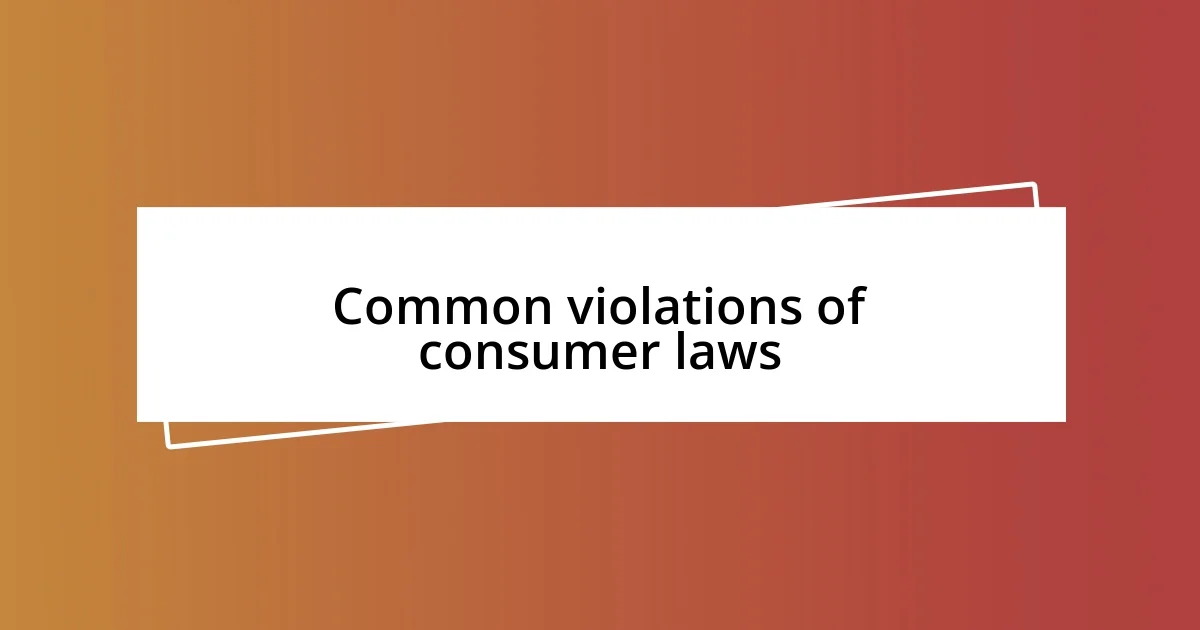
Common violations of consumer laws
When we talk about common violations of consumer laws, misleading advertising often tops the list. Just the other day, I encountered an ad that promised “no hidden fees” on a service. Yet, upon signing up, I was bombarded with unexpected charges. It made me ponder: how many others have fallen for similar traps? These deceptive claims can cost consumers dearly, leading to frustration and distrust.
Another frequent issue arises with defective products that aren’t recalled. I vividly remember purchasing a blender that had an inherent flaw and overheated while in use. It left me not only disappointed but also concerned for my safety. When manufacturers fail to promptly address known defects and notify consumers, it feels like they’re placing profit over people. Isn’t it disheartening when our safety isn’t prioritized?
Finally, let’s not overlook unauthorized data sharing. I recently received a notification about a breach from a retailer I trusted. It struck a chord with me; I felt a mix of anger and vulnerability knowing my personal information might be out there without my consent. Why should we accept compromised privacy when consumer protection laws are designed to safeguard us? It’s a stark reminder of the importance of holding businesses to account.
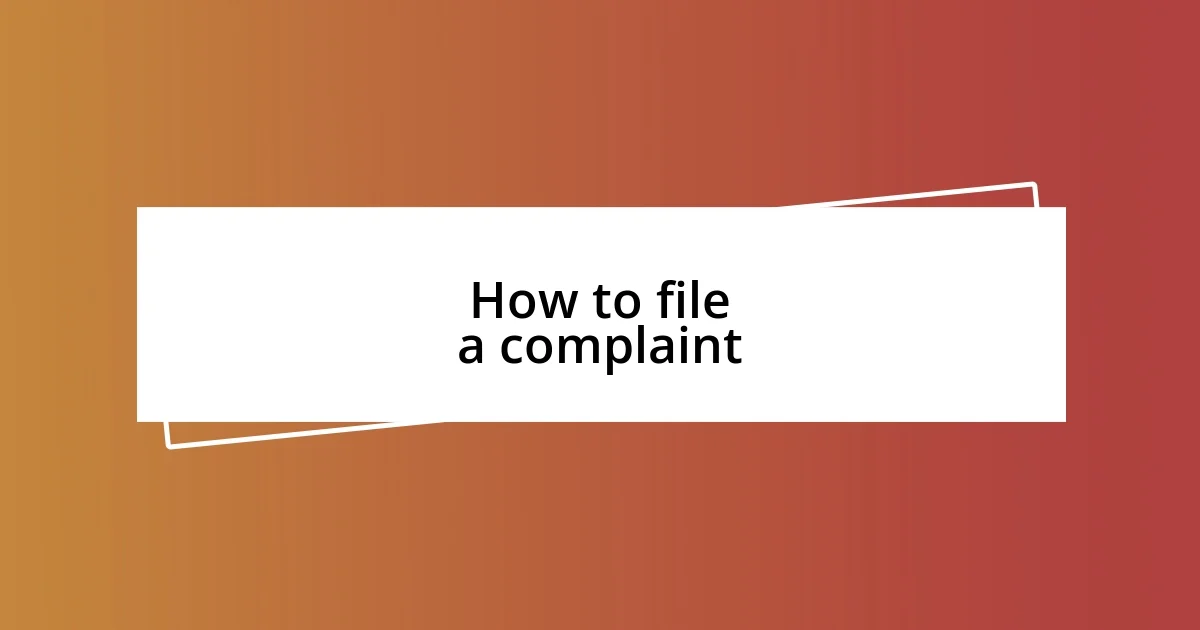
How to file a complaint
Filing a complaint may seem daunting, but I’ve navigated the process successfully a couple of times. First, I recommend gathering all relevant documentation; this includes receipts, product information, and any correspondence with the company. When I filed my complaint about a faulty gadget, having all the details in one place made my case stronger and easier to present.
Next, determine the correct channel to submit your complaint. Many companies have dedicated customer service hotlines or online forms specifically designed for such issues. I once reached out to a retailer through their social media page, thinking it would get their attention faster – and it did! It’s crucial to find the best way to make your voice heard, as some companies prioritize complaints submitted through specific platforms.
Remember, persistence is key. If you don’t receive a satisfactory response right away, don’t hesitate to follow up. When I had to chase down a resolution for a billing error, I learned that a polite yet firm approach often opens doors. Have you ever felt like giving up? I understand that frustration, but staying engaged can be the difference between a dead end and a resolution.
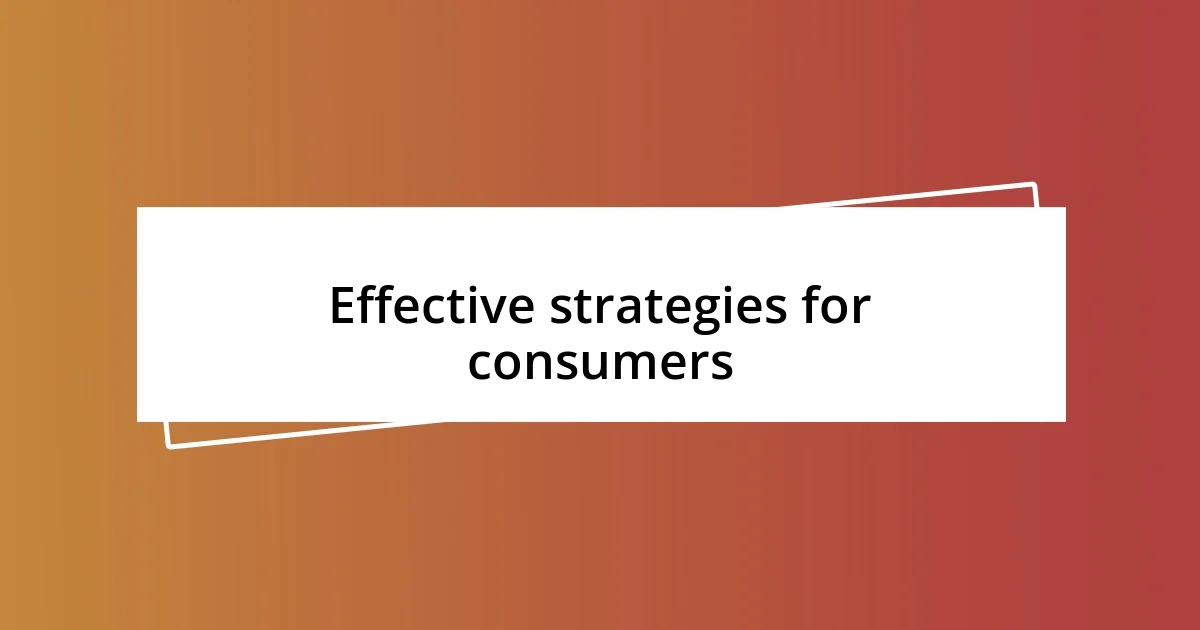
Effective strategies for consumers
Effective strategies for consumers involve being proactive and informed. One strategy I find invaluable is thoroughly researching products and services before making a purchase. For instance, when I was looking to buy a new smartphone, I scoured reviews and compared features to ensure I wasn’t just swayed by flashy advertising. Have you ever made a hasty purchase only to regret it later? Taking the time to gather information can save you from buyer’s remorse.
Another approach is to utilize consumer protection resources like watchdog websites and government agencies. I remember stumbling upon a user-friendly site that outlined consumer rights and provided tips for various situations. It empowered me to approach my issues with more confidence and clarity. Are you familiar with these resources? Trust me, they can be a game changer when you need to navigate disputes or seek redress.
Finally, don’t underestimate the power of community support. Sharing experiences with friends or on social media can help illuminate problems many others might be facing. When a few of us banded together to voice concerns about a local business, it not only led to a resolution but also created awareness that prompted the business to improve practices. Have you ever felt that collective energy? It’s a reminder that united voices are harder to ignore.
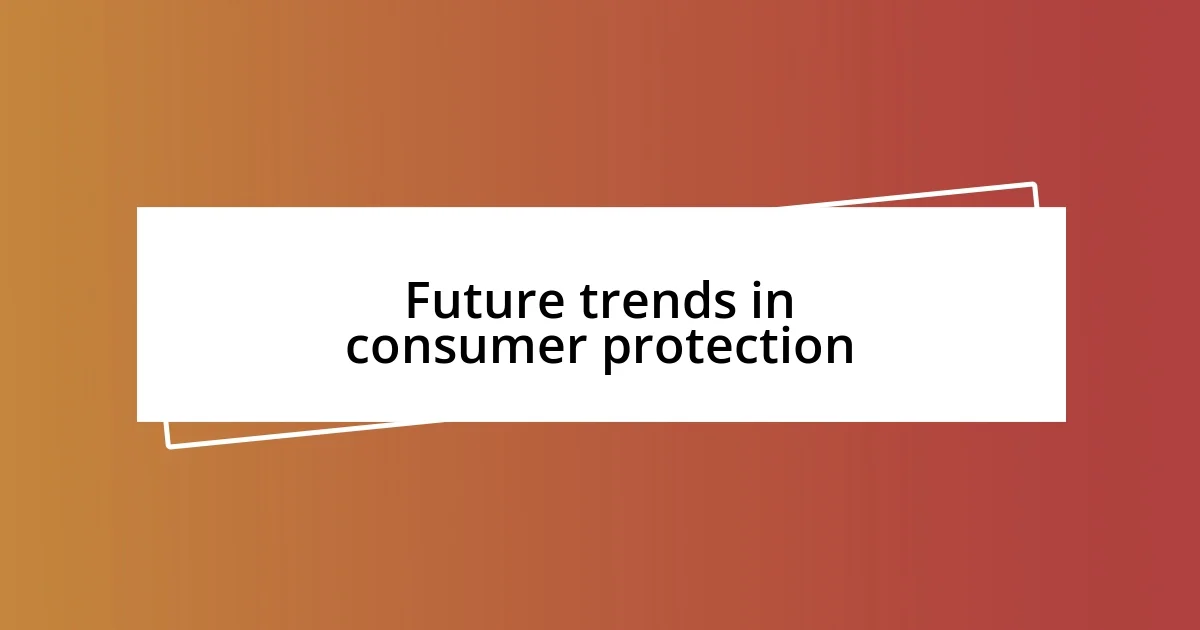
Future trends in consumer protection
As we look toward the future of consumer protection, technology is set to play a significant role in enhancing transparency. I recall a time when I found myself puzzled by hidden fees on my bank statement. If there were more tools available to track these charges in real time, it could have saved me a lot of time and confusion. Imagine a world where apps help consumers identify potential red flags before making a purchase—this would empower us to make more informed decisions, don’t you think?
Another interesting trend is the growing emphasis on data privacy. I remember feeling anxious about sharing my personal information online, worried about how it might be used. With increasing regulations aimed at safeguarding consumer data, like the General Data Protection Regulation (GDPR), we can expect to see stronger protections in place. Consumers will likely demand more control over their data, and businesses that prioritize this will gain our trust.
Finally, I’ve noticed a shift towards more inclusive consumer protection laws that acknowledge diverse consumer needs. I once felt overlooked when a service didn’t accommodate my specific situation. In the future, we may see laws that truly reflect the realities of all consumers, ensuring that no one is left behind. This inclusion is not just beneficial; it’s essential for fostering a marketplace where everyone feels valued and protected. How does that resonate with your experiences?














